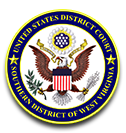Duties Under the Federal Rules of Criminal Procedure
Magistrate judges are also authorized to:
- exercise general supervision of criminal calendars, conduct calendar and status calls, conduct hearings, and determine motions to expedite or postpone the trial of cases for the district judges;
- conduct pretrial conferences, scheduling conferences, and related pretrial proceedings;
- conduct arraignments in criminal cases not triable by a magistrate judge and take not guilty pleas in such cases;
- with the consent of the parties, conduct arraignments in criminal cases not triable by a magistrate judge, receive a defendant's guilty plea, and submit proposed findings of fact and recommendations as to whether the presiding district judge should accept the guilty plea, and find the defendant guilty;
- for grand jury duty, determine the qualification of specific grand jurors to participate in the investigation of particular matters, determine motions to quash grand jury subpoenas, and receive grand jury returns;
- with the consent of the parties, conduct voir dire and preside over the selection of petit juries;
- accept waivers of indictment;
- conduct necessary proceedings leading to the potential revocation of probation or supervised release;
- issue subpoenas, writs of habeas corpus ad testificandum or habeas corpus ad prosequendum, or other orders necessary to obtain the presence of parties, witnesses, or evidence for court proceedings;
- order the exoneration or forfeiture of bonds;
- conduct proceedings for initial commitment of narcotic addicts under Title III of the Narcotic Addict Rehabilitation Act, 42 U.S.C. §§ 3401 et seq.;
- order the examination of a defendant to determine his or her mental competence to understand the nature and consequences of the proceeding against the defendant or to assist properly in his or her defense, and conduct hearings on a defendant=s mental competence, and to determine if a defendant is presently suffering from a mental disease or defect which would give rise to the defense of insanity, or which is inconsistent with the mental state required for the offense charged, all as provided in 18 U.S.C. § 4241 et seq.;
- supervise proceedings conducted pursuant to letters rogatory as provided in 28 U.S.C. § 1782(a);
- issue orders of withdrawal of funds from the court registry pursuant to 28 U.S.C. § 2042;
- conduct extradition proceedings in accordance with 18 U.S.C. § 3184;
- issue orders or warrants authorizing acts necessary in the performance of the duties of administrative and regulatory agencies and departments of the United States; and
- serve with designated committees or other judicial officers, participate in promulgation of local rules and procedures, administration of the forfeiture of collateral system, and other functions of court governance as approved by the Chief Judge.
